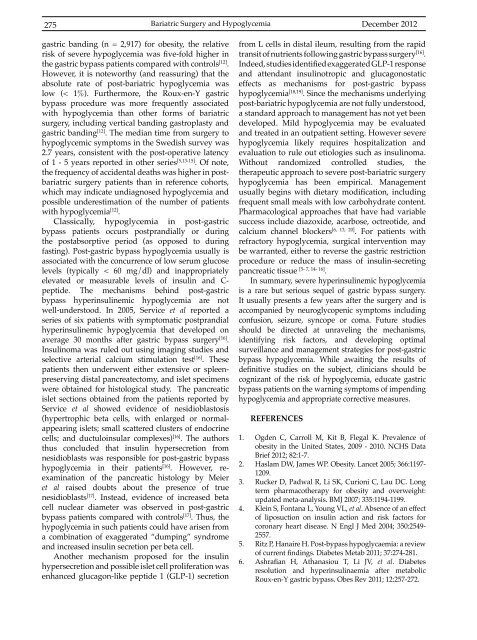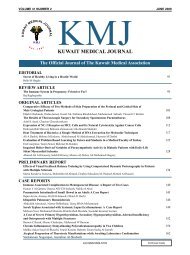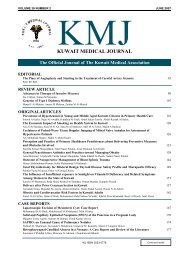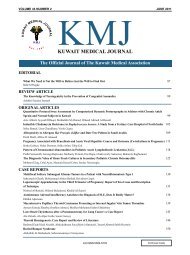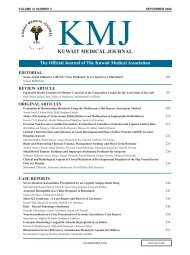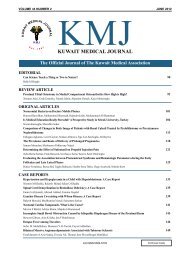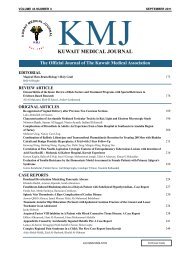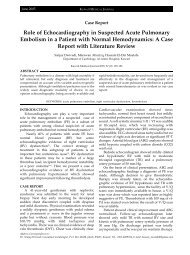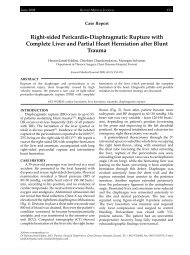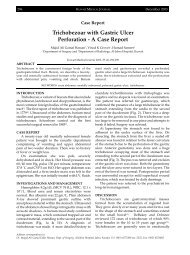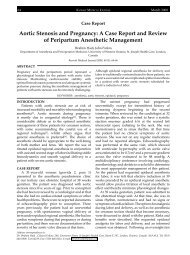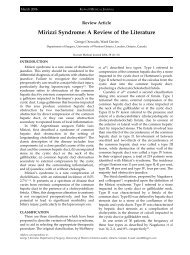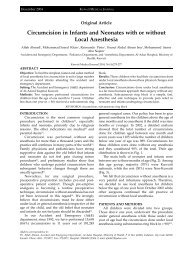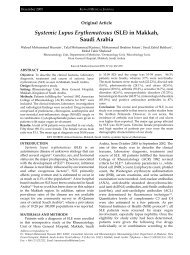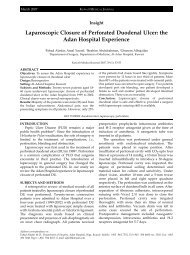Vol 44 # 4 December 2012 - Kma.org.kw
Vol 44 # 4 December 2012 - Kma.org.kw
Vol 44 # 4 December 2012 - Kma.org.kw
Create successful ePaper yourself
Turn your PDF publications into a flip-book with our unique Google optimized e-Paper software.
275 Bariatric Surgery and Hypoglycemia<br />
<strong>December</strong> <strong>2012</strong><br />
gastric banding (n = 2,917) for obesity, the relative<br />
risk of severe hypoglycemia was five-fold higher in<br />
the gastric bypass patients compared with controls [12] .<br />
However, it is noteworthy (and reassuring) that the<br />
absolute rate of post-bariatric hypoglycemia was<br />
low (< 1%). Furthermore, the Roux-en-Y gastric<br />
bypass procedure was more frequently associated<br />
with hypoglycemia than other forms of bariatric<br />
surgery, including vertical banding gastroplasty and<br />
gastric banding [12] . The median time from surgery to<br />
hypoglycemic symptoms in the Swedish survey was<br />
2.7 years, consistent with the post-operative latency<br />
of 1 - 5 years reported in other series [5,13-15] . Of note,<br />
the frequency of accidental deaths was higher in postbariatric<br />
surgery patients than in reference cohorts,<br />
which may indicate undiagnosed hypoglycemia and<br />
possible underestimation of the number of patients<br />
with hypoglycemia [12] .<br />
Classically, hypoglycemia in post-gastric<br />
bypass patients occurs postprandially or during<br />
the postabsorptive period (as opposed to during<br />
fasting). Post-gastric bypass hypoglycemia usually is<br />
associated with the concurrence of low serum glucose<br />
levels (typically < 60 mg/dl) and inappropriately<br />
elevated or measurable levels of insulin and C-<br />
peptide. The mechanisms behind post-gastric<br />
bypass hyperinsulinemic hypoglycemia are not<br />
well-understood. In 2005, Service et al reported a<br />
series of six patients with symptomatic postprandial<br />
hyperinsulinemic hypoglycemia that developed on<br />
average 30 months after gastric bypass surgery [16] .<br />
Insulinoma was ruled out using imaging studies and<br />
selective arterial calcium stimulation test [16] . These<br />
patients then underwent either extensive or spleenpreserving<br />
distal pancreatectomy, and islet specimens<br />
were obtained for histological study. The pancreatic<br />
islet sections obtained from the patients reported by<br />
Service et al showed evidence of nesidioblastosis<br />
(hypertrophic beta cells, with enlarged or normalappearing<br />
islets; small scattered clusters of endocrine<br />
cells; and ductuloinsular complexes) [16] . The authors<br />
thus concluded that insulin hypersecretion from<br />
nesidioblasts was responsible for post-gastric bypass<br />
hypoglycemia in their patients [16] . However, reexamination<br />
of the pancreatic histology by Meier<br />
et al raised doubts about the presence of true<br />
nesidioblasts [17] . Instead, evidence of increased beta<br />
cell nuclear diameter was observed in post-gastric<br />
bypass patients compared with controls [17] . Thus, the<br />
hypoglycemia in such patients could have arisen from<br />
a combination of exaggerated “dumping” syndrome<br />
and increased insulin secretion per beta cell.<br />
Another mechanism proposed for the insulin<br />
hypersecretion and possible islet cell proliferation was<br />
enhanced glucagon-like peptide 1 (GLP-1) secretion<br />
from L cells in distal ileum, resulting from the rapid<br />
transit of nutrients following gastric bypass surgery [16] .<br />
Indeed, studies identifiedexaggeratedGLP-1response<br />
and attendant insulinotropic and glucagonostatic<br />
effects as mechanisms for post-gastric bypass<br />
hypoglycemia [18,19] . Since the mechanisms underlying<br />
post-bariatric hypoglycemia are not fully understood,<br />
a standard approach to management has not yet been<br />
developed. Mild hypoglycemia may be evaluated<br />
and treated in an outpatient setting. However severe<br />
hypoglycemia likely requires hospitalization and<br />
evaluation to rule out etiologies such as insulinoma.<br />
Without randomized controlled studies, the<br />
therapeutic approach to severe post-bariatric surgery<br />
hypoglycemia has been empirical. Management<br />
usually begins with dietary modification, including<br />
frequent small meals with low carbohydrate content.<br />
Pharmacological approaches that have had variable<br />
success include diazoxide, acarbose, octreotide, and<br />
calcium channel blockers [6, 13, 20] . For patients with<br />
refractory hypoglycemia, surgical intervention may<br />
be warranted, either to reverse the gastric restriction<br />
procedure or reduce the mass of insulin-secreting<br />
pancreatic tissue [5- 7, 14- 16] .<br />
In summary, severe hyperinsulinemic hypoglycemia<br />
is a rare but serious sequel of gastric bypass surgery.<br />
It usually presents a few years after the surgery and is<br />
accompanied by neuroglycopenic symptoms including<br />
confusion, seizure, syncope or coma. Future studies<br />
should be directed at unraveling the mechanisms,<br />
identifying risk factors, and developing optimal<br />
surveillance and management strategies for post-gastric<br />
bypass hypoglycemia. While awaiting the results of<br />
definitive studies on the subject, clinicians should be<br />
cognizant of the risk of hypoglycemia, educate gastric<br />
bypass patients on the warning symptoms of impending<br />
hypoglycemia and appropriate corrective measures.<br />
REFERENCES<br />
1. Ogden C, Carroll M, Kit B, Flegal K. Prevalence of<br />
obesity in the United States, 2009 - 2010. NCHS Data<br />
Brief <strong>2012</strong>; 82:1-7.<br />
2. Haslam DW, James WP. Obesity. Lancet 2005; 366:1197-<br />
1209.<br />
3. Rucker D, Padwal R, Li SK, Curioni C, Lau DC. Long<br />
term pharmacotherapy for obesity and overweight:<br />
updated meta-analysis. BMJ 2007; 335:1194-1199.<br />
4. Klein S, Fontana L, Young VL, et al. Absence of an effect<br />
of liposuction on insulin action and risk factors for<br />
coronary heart disease. N Engl J Med 2004; 350:2549-<br />
2557.<br />
5. Ritz P, Hanaire H. Post-bypass hypoglycaemia: a review<br />
of current findings. Diabetes Metab 2011; 37:274-281.<br />
6. Ashrafian H, Athanasiou T, Li JV, et al. Diabetes<br />
resolution and hyperinsulinaemia after metabolic<br />
Roux-en-Y gastric bypass. Obes Rev 2011; 12:257-272.


